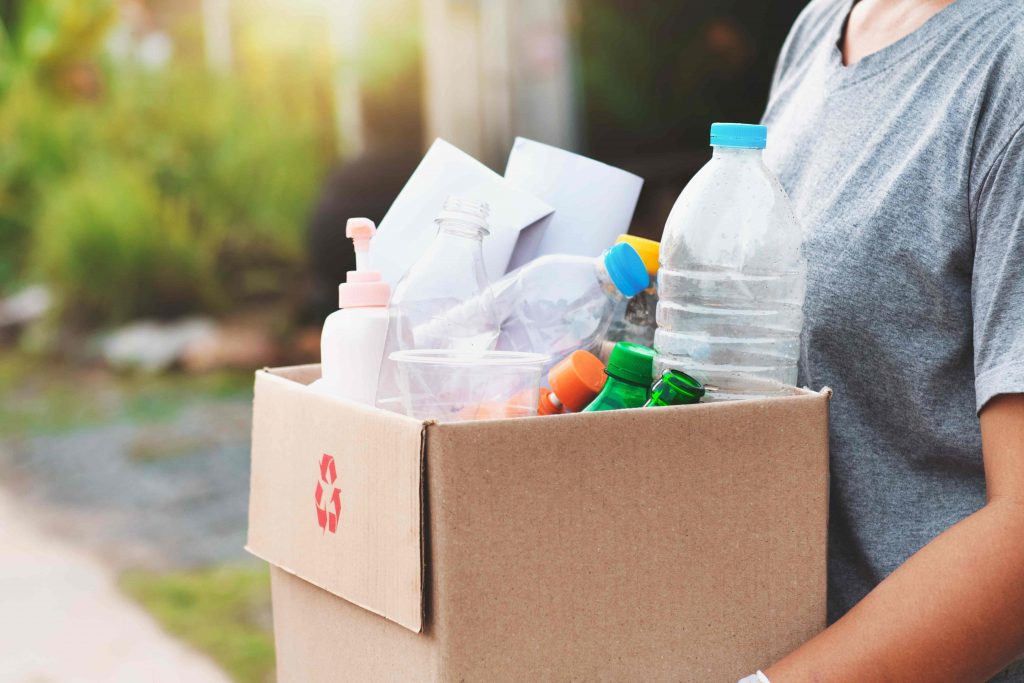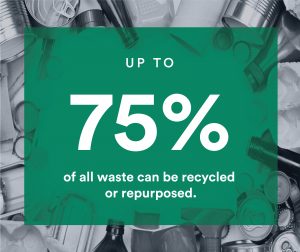Imagine a world where there’s little to no waste. A world where everything we throw out is repurposed or reused. A world where all of the materials we discard are recycled and utilized in new products. Well, here’s the thing about our trash; in truth, most of it is not trash at all.
Today, recycling is more important than ever. Year on year, global rates of consumption are rising and so is our appetite for new things. However, if we begin to look at the waste created by these levels of consumption in a different light, then a whole new world of opportunity is revealed. Put simply, recycling is much more than a way to reduce the amount of material sent to landfill, it is a proven method of reclaiming valuable materials that can be used in new products.
Our waste is not worthless
Whether it’s paper or plastic, aluminum or e-waste, products and materials that have fulfilled their original purpose are far from worthless. In fact, aluminum, plastic, cardboard, and paper are all of value, while large quantities of e-waste can command extremely high prices thanks to the precious metals contained inside.
Our waste then, should be in demand—with good reason. It is estimated that up to 75% of all waste can be recycled or repurposed, and this startling figure has a number of positive implications for an industry that aims to reassert the importance of recycling. If we can change the way we think about waste on both a consumer and commercial level, then we can truly understand the importance of recycling.
Organics – The original recyclable
Understanding the true value of recycling is perhaps best highlighted when we consider organics—the original recyclable. Composting goes back millennia, and it remains one of the most efficient forms of recycling in use today, relying on a purely natural processes to breakdown waste which is then used as compost or fertilizer. Put simply, it is a process that feeds itself—and billions of people around the world!
However, the unenviable status of organics as the largest single component within MSW means that, somewhere along the way, we have forgotten that even our rotting vegetables have worth. Effectively dealing with our food waste then, and other organic materials from gardens or farms, should not be underestimated. Not only does it provide us with sustenance, a black gold used globally to improve soil fertility, but it also serves as an archetype for how we should view all materials, giving us an ancient example of the circular economy in action.
The benefits of recycling
Many of the benefits associated with recycling are clear to see. First, the size and number of landfill sites is reduced, minimizing the impact that huge piles of mixed waste can have on the environment. In turn, this allows smaller landfill sites to work more effectively, and it is hoped that over time, as recycling rates rise and materials become part of a circular economy, landfills will be phased out entirely.
Second, putting greater value on recyclables and other waste products allows us to be less reliant on natural resources and fossil fuels. Using recyclables as raw materials for new products often significantly reduces the amount of energy required in manufacturing. Additionally, using materials already in circulation minimizes the need to extract and process natural resources—saving energy and the environment at the same time.
Other, perhaps less obvious benefits of recycling may also begin to mitigate some of the economic issues facing societies that are edging towards carbon neutrality. For instance, in 2007, the EPA estimated that the US recycling industry accounted for 757,000 jobs, paying out $36.6 billion in wages and generating $6.7 billion in tax revenue. The growth of the recycling industry over the next ten years is likely to double this figure, helping to replace jobs lost in other, more environmentally destructive industries such as mining and crude oil processing.
However, another resource exists that has, until now, been wholly overlooked. Today, some companies are beginning to “mine” existing landfill sites for valuable resources, with many predicting that these manmade mines will be extremely lucrative as we decarbonize our economies. This innovative approach to recycling has the potential to both reduce “non-sanitary” landfill sites and allow us to reclaim metals that are in short supply—particularly those metals used in clean technologies such as photovoltaic cells, e-cars, and wind turbines.
A cleaner world and a stronger economy
Among the most pressing concerns for the recycling industry is changing the way we think about waste. When we begin to see the products we throw out as valuable commodities within themselves, then we are much more likely to recycle responsibly. Attitudes to waste must change on both an individual and commercial level to support these changes. The industry itself must step up to streamline collection and improve processing facilities in order to maximize recycling rates across the globe. Improved commercial recycling systems are key to ensuring recycling is easier than simply dumping waste products in landfill.
The importance of the waste management hierarchy must also be factored into a global movement towards more environmentally conscious consumption—providing the foundations for a more efficient and effective recycling industry. This means consumers must continue to kick back against manufacturers’ “single-use” policies and further movements that aim to remove disposable packaging from the chain entirely.
Continued pressure on manufactures to create more environmentally sound products that can be reused or repaired will also help to reduce the burden on a nascent recycling industry—allowing processing facilities to get up to speed with the huge amounts of waste we create on a daily basis.
And here is where the importance of the recycling industry really comes into focus. Through concerted efforts, from both manufacturers and consumers, shifting the status quo and redesigning our existing “take, make, and dispose” culture must be the priority. Recycling is, not a one-size-fits-all solution, but a crucial component of a circular economy that crosses borders, politics, and economies.
For more information on the circular economy, on the recycling industry, and on other important sustainability issues, stay tuned to the RTS blog. Additionally, if your business requires insightful advice and guidance on how to recycle more effectively, get in touch for a free waste assessment today





